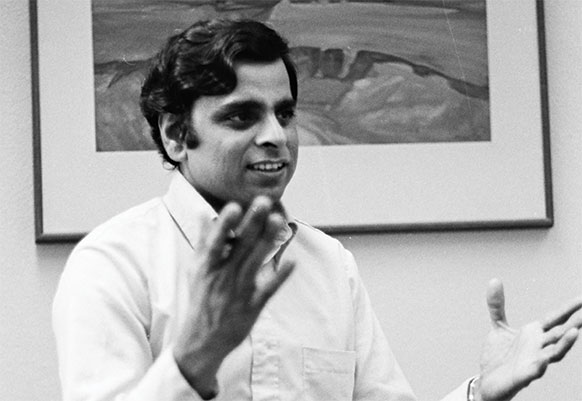
IRIS login | Reed College home Volume 93, No. 3: September 2014
Last Lectures
V. Rao Potluri [mathematics 1973–2014]

By Randall S. Barton
“It is amazing how much influence a teacher has on students,” says Prof. V. Rao Potluri. “Somebody takes one or two classes from a good teacher, and that defines his career. That’s what happened to me.”
Potluri grew up poor in a small village on the coast of Andhra Pradesh in India without electricity or plumbing. As a boy, he used a yoke to fetch water from the well. “It was a happy existence,” he says. “We didn’t know how to be sad.”
Under the tutelage of two professors at Andhra University, Potluri thrilled to the rigorous logic of mathematics and decided that one day he would teach it himself.
After he earned an MS from Banaras Hindu University in 1968, Potluri was invited to do graduate work with Charles Curtis, a renowned algebraist teaching at the University of Wisconsin at Madison. He later transferred to the University of Oregon, earning a PhD in abstract algebra in 1973.
Potluri was initially invited to fill a one-year vacancy in Reed’s mathematics department and wound up staying for 41 years. He considers it a privilege to teach at Reed. “Reed students come to learn,” he says. “They don’t come to play football. They’re very motivated, and teaching motivated kids is a wonderful experience. I don’t think of them as students so much as friends.”
For the past 10 years, he has driven a Honda 750 motorcycle to work, and he describes himself as a “simple-living” guy. The only extravagance to interest him has been good private schools for his children.
Potluri becomes circumspect when asked if math, a field of definite results, can be used to prove the existence of God. Allowing that mathematical laws are often followed in nature, he mentions Snell’s law, which deals with the velocity of light.
“When light travels through two different media, the velocity changes,” Potluri explains. “It bends and chooses a different path, and that angle of refraction is governed by the fastest way for the light to travel. So, light is smart; it always chooses the fastest way to reach from here to there. When you think about things like that you might think, ‘God is a mathematician.’”

LATEST COMMENTS
steve-jobs-1976 I knew Steve Jobs when he was on the second floor of Quincy. (Fall...
Utnapishtim - 2 weeks ago
Prof. Mason Drukman [political science 1964–70] This is gold, pure gold. God bless, Prof. Drukman.
puredog - 1 month ago
virginia-davis-1965 Such a good friend & compatriot in the day of Satyricon...
czarchasm - 4 months ago
John Peara Baba 1990 John died of a broken heart from losing his mom and then his...
kodachrome - 7 months ago
Carol Sawyer 1962 Who wrote this obit? I'm writing something about Carol Sawyer...
MsLaurie Pepper - 8 months ago
William W. Wissman MAT 1969 ...and THREE sisters. Sabra, the oldest, Mary, the middle, and...
riclf - 10 months ago